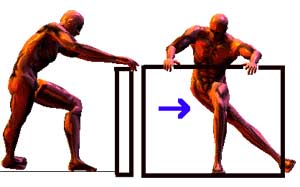Without friction?
Thanks to friction, you can sit, walk and work easily; thanks to which the pen and book rests on the table, the table does not slip on the floor, although people do not put it close to the wall, and the pen does not slip off the fingers .
Friction is such a common phenomenon that we rarely pay attention to its useful effects, but often give it a natural phenomenon.
 Without friction, all will slip and roll until they reach a really balanced position for each other (Artwork: rice.edu) Thanks to the friction the objects are more stable. The carpenter joins the floor flat so that when people put the tables and chairs where they stand there. Cups, plates, spoons placed on the table are all laid still, but we do not need to pay special attention to them, if there is no abnormal situation such as on the ship.
Without friction, all will slip and roll until they reach a really balanced position for each other (Artwork: rice.edu) Thanks to the friction the objects are more stable. The carpenter joins the floor flat so that when people put the tables and chairs where they stand there. Cups, plates, spoons placed on the table are all laid still, but we do not need to pay special attention to them, if there is no abnormal situation such as on the ship.
Imagine that it is possible to eliminate friction completely, there will be no object, whether it is as big as a rock or as small as a grain of sand, can rest firmly on each other. All will slip and roll until they reach a real balance position for each other. If there is no friction, our earth will turn into a smooth sphere like a ball of water.
It can be said that without friction, the screws will fall out of the wall, no objects will be held in hand, no tornado will stop, no sound will be resounded into one endless echoes, because reflexes are not weak to the walls. Every time we go on ice, we have a specific lesson to reinforce our belief in the special importance of friction. Going on the street with a bandage or on the dirt road after it rains, I feel I am helpless and always want to fall .
However, in technology one can use very little friction to serve useful things. For example, sleds on ice, or runways used to transport timber from mining to railroads, or to river wharves to release rafts. On smooth rails, two horses were able to pull 70 tons of wood.
- Leonardo Da Vinci was the first systematic study of friction?
- Evidence explains why we have fingerprints
- 'Super-smooth' material eliminates friction from graphene and diamonds
- Unique device produces electricity from ... snowfall
- Generator helps to collect electricity during vehicle operation
- Snake climbing a tree in any way?
- New discovery: The moon is shaped like a lemon
- Decipher the mystery of snakes' ability to crawl
- Why does the basketball surface always have tiny dots?
- The strange tribe refused civilization, lived like ten thousand years ago
- The cause of the wool is not falling when it rains
- Reveal the secret to help people walk on the water
 'Barefoot engineer' invents a pipeless pump
'Barefoot engineer' invents a pipeless pump Process of handling dead pigs due to disease
Process of handling dead pigs due to disease Radiometer
Radiometer Warp Engine: Technology brings us closer to the speed of light
Warp Engine: Technology brings us closer to the speed of light